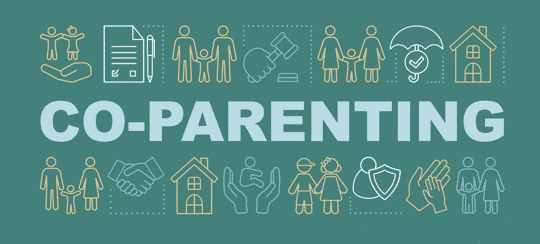After a divorce or separation from your partner, one of your top priorities is to establish the best parenting situation for your children. Yet, maintaining an amicable relationship with your ex is easier said than done. How do you realistically co-parent when there is tension and conflict between you and the other parent of your child?
If you share custody with your ex-spouse, co-parenting and parallel parenting are two methods that can decrease conflict while providing the best care for children. Understanding the difference between co-parenting vs. parallel parenting can help you make the best decision for you and your child.
What is Co-Parenting?
Co-parenting is when two parents who are no longer in a marriage or romantic relationship choose to raise their child together. Both parents share equal responsibility for the child’s upbringing. The child is encouraged to maintain a relationship with both parents, and usually splits their time with the two parents.
In co-parenting, parents maintain some sort of cordial relationship. That could be a friendship, or it could just mean that the two parents are civil with each other when communicating about their child. Co-parenting does not necessarily mean that there is no conflict between the two parents, but the conflict should not interfere with the child or the child’s relationship with either parent.
Benefits of Co-Parenting
Co-parenting is often the preferred parenting style for divorced parents because of the numerous benefits. Pros include:
- The child builds a positive relationship with both parents.
- Minimization the risk of parentification, during which a child takes on the role of an adult and assumes responsibility to keep the peace between parents.
- The child does not feel as if they must choose between the two parents. They are able to spend holidays and special occasions with both parents.
- There is a sense of stability for the child.
Tips When Co-Parenting
Build the healthiest environment for your child by keeping these tips in mind when co-parenting.
- Talk about issues or questions directly with the other parent rather than relying on the child to be the messenger.
- Maintain a cordial relationship with the other parent. Avoid expressing anger or ill feelings about the other parent in front of the child.
- Keep essential and duplicate items at each parent’s home so the child doesn’t have to pack as much when switching between homes.
- Be positive, or at least neutral, about the child’s visit with their other parent.
- Let the child have some control of the “parenting time,” which is the time they spend with each parent. This is especially important as the child grows older and has other commitments or wants to spend time with friends.
- Support the child’s time with friends rather than making the child feel guilty. Do not tell them their time with friends is not as important as their time with you.
When co-parenting, both parents must be supportive and respectful of the other parent’s right to a good relationship with their child. However, this can seem almost impossible for some ex-spouses. In those scenarios, parallel parenting is the next best option.
What is Parallel Parenting?
Parallel parenting is similar to co-parenting, but the separated parents limit direct contact. This method works best for high-conflict families where parents are not able to communicate without escalating tension. Many recently divorced parents choose to participate in parallel parenting, although they might switch to a co-parenting model as time passes and conflict subsides between the two parents.
Under the parallel parenting model, parents usually divide decision-making so they don’t have to meet and discuss the day-to-day aspects of parenting. Parents also have the freedom to make their own rules and parent in their own way. Parallel parenting is an excellent alternative to co-parenting in custody cases where the judge does not have a basis to decide which parent should have primary custody. However, parallel parenting is not appropriate for situations where there is family violence and either the child’s or a parent’s safety is at risk.
Benefits of Parallel Parenting
There are several reasons divorced parents choose parallel parenting over co-parenting. These are some of the benefits.
- Decreases child’s exposure to parental conflict.
- Each parent can adhere to their own parenting rules.
- The child can establish healthy relationships with both parents.
Tips When Parallel Parenting
Even if you aren’t on speaking terms with your ex, you can make sure your child has the support and love they deserve as they grow. These are some tips to make parallel parenting work.
- Create a very specific initial parenting plan in order to limit direct communication with the other parent.
- Do not depend on the child to pass information between you and the other parent.
- Stick to the parenting schedule. If changes are necessary, make sure there is a written agreement.
- Use a parent communication notebook so parents can explain the child’s emotions, behaviors, and other important information when the child is in their care.
- Ask a third party to be present if you need to meet face-to-face with the other parent to discuss important decisions, including school, religion, and medical care.
When comparing co-parenting vs. parallel parenting, it’s important to remember that both require cooperation and communication. Parents need to be able to establish clear boundaries with each other in order to avoid conflict. Studies have shown that conflict between parents causes the most pain for children after their parents separate.
Parents should also not encourage their child to choose sides. Children that have positive relationships with both parents are more likely to have better psychological and behavioral adjustment. They are also more likely to achieve higher academic performance than children whose parents are constantly in conflict.
Your local family law attorney can help answer any questions you have about child custody, or help you prepare your case. For more information about child custody, read the article Child Custody: Tips of What to Do.


